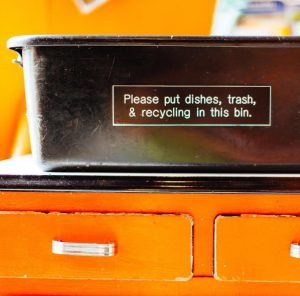By Matthew Scott, Lemonjello’s Coffee
STOP! READ THIS NOW! If you’re reading this, that worked. But consumers don’t read signs. So, what do you do when you can’t rely on messaging to get sustainability results?
At Lemonjello’s Coffee, we are committed to trying run a zero-waste business. In doing that, we’ve run into four big problems. Here they are, and some ways to address them.
 Problem 1: Customers don’t always know what to put where if you offer options for their waste.
Problem 1: Customers don’t always know what to put where if you offer options for their waste.
There might be many reasons: They aren’t local and don’t know the local recycling rules. They have never encountered compostable take-away products. They don’t see the need. They are sick of getting chastised for “doing it wrong.”
So, if you want them to buy in, it’s important to minimize customer confusion. We did it by removing our trash cans and directing all items to a dish bin that we sort. It’s easy and the same amount of work for my staff.
Problem 2: Every waste facility and every city has different ways of recycling and composting.
What a waste facility chooses to recycle depends on market demand and the ability to monetize the process. When certain types of recyclable materials are not collected, sometimes you can find alternative facilities. Sometimes you can’t.
Composting is similarly dependent on market demand. Commercial composting facilities sell to farms and reduce waste to nothing to keep it out of the landfill, but again, depending on demand.
Do your homework. Find out your local options and align your purchasing and waste systems with the options you have.
Problem 3: Desire, effort, and the help of your workforce.
Some people care about sustainability and some don’t. Getting the whole team to participate takes constant reiteration and some form of making it fun.
Still, there’s always that occasional employee or customer who complains.
So, focus on the people who will get into it. Find ways to make it easy, fun, and a lifestyle choice.
Problem 4: Does it even matter?
Sometimes the energy used to recycle or compost is greater than throwing an item away. Sometimes you don’t always know how your waste gets handled at facilities. There must be a balance with labor hours, burden to staff, cost of pickup and transport, and cost of goods.
And, while recycling does good, much of it is “feel good,” too. But positive emotions help drive sales, which helps keep an economy running and fuels consumer awareness.
 Still, that question persists: Does it matter?
Still, that question persists: Does it matter?
I’ve accepted that I won’t always know. That’s OK, at least for me.
So, I try to make it easy for folks, know what I can do, get my staff into it, and get along on my merry way.
Matthew Scott is the founder of Lemonjello’s Coffee, a zero-waste café. He also works as a writer, teacher and consultant for coffee businesses. His passion for sustainability came from his grandparents, who taught him it wasn’t hard to be a steward of your resources if you choose to do it. https://lemonjellos.com/
PHOTO CUTLINE –
Lemonjellos1.jpg (or png) Lemonjello’s customers put everything in one bin, solving Problem 1, customer confusion, which helps the cafe’s efforts to recycle and compost more than 85 percent of waste.
![]() This Week’s Sustainability Framework Theme
This Week’s Sustainability Framework Theme
Environmental Awareness/Action: Environmental education and integrating environmental practices into our planning will change negative outcomes of the past and improve our future.
 ABOUT THIS SERIES
ABOUT THIS SERIES
Living Sustainably is a collection of community voices sharing updates about local sustainability initiatives. It is presented by the Holland-Hope College Sustainability Institute, a joint project of Hope College, the City of Holland and Holland Board of Public Works. Go to www.hope.edu/sustainability-institute for more information.

